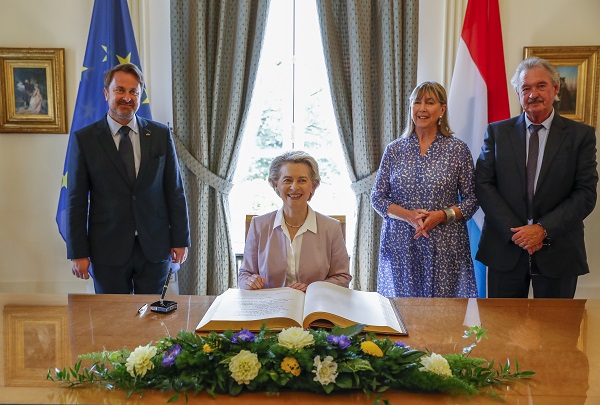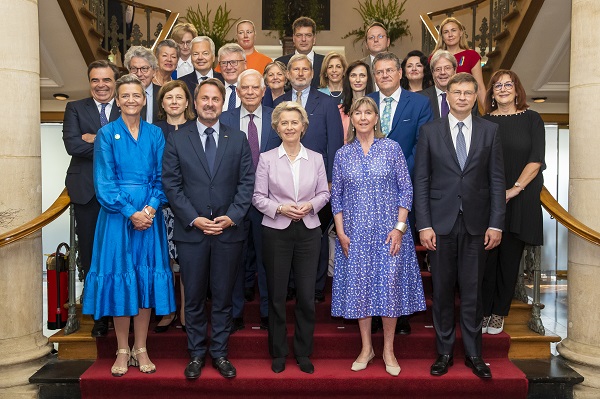 L-R: Luxembourg's Prime Minister Xavier Bettel; European Commission President Ursula von der Leyen; Lydie Polfer, Mayor of Luxembourg City; Jean Asselborn, Luxembourg's Minister of Foreign & European Affairs;
Credit: SIP / Julien Warnand
L-R: Luxembourg's Prime Minister Xavier Bettel; European Commission President Ursula von der Leyen; Lydie Polfer, Mayor of Luxembourg City; Jean Asselborn, Luxembourg's Minister of Foreign & European Affairs;
Credit: SIP / Julien Warnand
On Wednesday 13 July 2022, on the occasion of the 70th anniversary of the inaugural meeting of the High Authority of the European Coal and Steel Community (ECSC), which was originally based in Place de Metz in Luxembourg-Ville, the College of European Commissioners held its weekly meeting at Luxembourg City's town hall, at the invitation of the Luxembourg Government.
It was in the premises of the municipal council that the High Authority of the ECSC, executive body of this first European community, held its first meeting on 10 August 1952. As such, it was important to the Luxembourg Government and the City of Luxembourg (Ville de Luxembourg - VdL) to celebrate the start of these works in Luxembourg, which made Luxembourg City the historic capital of the European institutions.
On Wednesday, Luxembourg's Prime Minister Xavier Bettel and the Mayor of the City of Luxembourg, Lydie Polfer, in the presence of members of the VdL college of aldermen, welcomed the President of the European Commission, Ursula von der Leyen, and the College of European Commissioners to the town hall.
Following the meeting of the College of Commissioners, President von der Leyen unveiled a commemorative plaque, in the presence of Prime Minister Bettel and Mayor Polfer, as well as Luxembourg's Minister of Foreign Affairs and European Affairs, Jean Asselborn. Luxembourg City's Mayor recalled that it was important to remember that these 70 years have been a time that has brought us wellbeing, unity and above all peace and that we must be grateful to all those who have contributed to the reconciliation and reconstruction of Europe.
This College of Commissioners' working meeting was followed by a working lunch offered by the government.
"After the destruction, the violence, the madness of war and murder, which saw its despicable and tragic height in the Holocaust, had ravaged our continent, the watchword was: ne plus jamais – nie wieder – never again. Or to quote Robert Schuman in his declaration of 9 May [1950]: 'World peace cannot be safeguarded without the making of creative efforts proportionate to the dangers which threaten it'", Prime Minister Bettel said during the working lunch. "Today, more than 72 years later, and in a different context but not completely detached from its origins, these words resonate the strongest. These creative efforts proportionate with the dangers that threaten peace, it is our historic duty to initiate them, to pursue them and to accomplish them. It is up to us to live up to these efforts. Because it was in the wake of the Schuman Declaration of 9 May 1950 that the Treaty of Paris, establishing the European Coal and Steel Community (ECSC), was signed on 18 April 1951 by Germany, Belgium, France, Italy, Luxembourg and the Netherlands. By establishing a single market for coal and steel, the aim was to make war in Europe not only unthinkable but also materially impossible".
To this end, the Treaty created several institutions: a High Authority, assisted by a Consultative Committee, a Common Assembly, a Special Council of Ministers and a Court of Justice. The question of the seat of these institutions was at the time the subject of lively discussions. It was finally at the end of July 1952 that Luxembourg's Minister for Foreign Affairs, Joseph Bech, proposed that the ECSC temporarily begin its work in Luxembourg.
The various institutions were only able to begin their activities in Luxembourg a few days later, with the session for the installation of the High Authority on 10 August 1952, chaired by Jean Monnet, the first session of the Special Council of Ministers on 8 September 1952, chaired by German Chancellor Konrad Adenauer, and, on 10 December 1952, the first working session of the Court of Justice. Following the arrival in the Grand Duchy of the first European civil servants, and their families, Luxembourg also became the cradle of the European Schools system, the first such school having been created in Luxembourg in October 1953.
70 years later, Luxembourg remains one of the three European capitals and continues to host the headquarters of many European institutions, agencies and bodies, in accordance with the primary law of the European Union (EU). Today, more than 14,000 civil servants and agents work in Luxembourg for various directorates of the European Commission, for the Secretariat of the European Parliament, the Court of Justice of the European Union (CJEU), the European Investment Bank (EIB), the Publications Office of the European Union, the European Court of Auditors, the European Stability Mechanism (ESM), the two European Schools, the Translation Centre for the Bodies of the European Union, the Joint Undertaking for High Performance Computing (EuroHPC) and the European Public Prosecutor's Office. The Court of Appeal and the Registry of the Unified Patent Court (UPC) have recently been added. This new court will be competent to hear cases of infringement and validity of new unitary patents as well as European patents.
Since 1965, the Council of the European Union has held its sessions in Luxembourg during the months of April, June and October.









